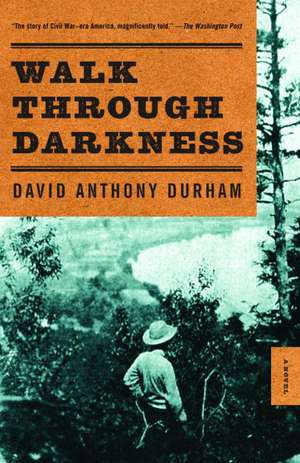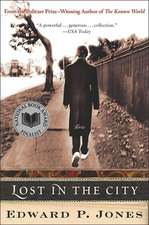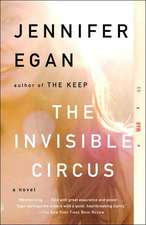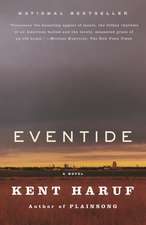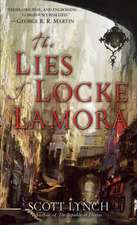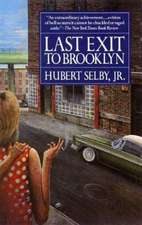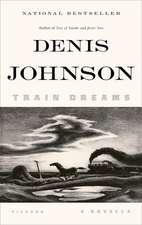Walk Through Darkness
Autor David Anthony Durhamen Limba Engleză Paperback – 31 iul 2003
Among those hunting William is Morrison, a Scot who as a young man fled the miseries of his homeland only to discover even more brutal realities in the New World. Bearing many scars, including the loss of his beloved brother, Morrison tracks William for reasons of his own, a personal agenda rooted in tragic events that have haunted him for decades.
Following up on his award-winning debut, Gabriel’s Story, David Anthony Durham presents another riveting tale, a brilliantly drawn portrait of America before the Civil War, and a provocative meditation on racial identity, freedom and equality.
Preț: 115.75 lei
Nou
Puncte Express: 174
Preț estimativ în valută:
22.15€ • 23.12$ • 18.33£
22.15€ • 23.12$ • 18.33£
Carte disponibilă
Livrare economică 14-28 martie
Preluare comenzi: 021 569.72.76
Specificații
ISBN-13: 9780385720366
ISBN-10: 038572036X
Pagini: 304
Dimensiuni: 133 x 205 x 16 mm
Greutate: 0.21 kg
Ediția:Anchor Books.
Editura: Anchor Books
ISBN-10: 038572036X
Pagini: 304
Dimensiuni: 133 x 205 x 16 mm
Greutate: 0.21 kg
Ediția:Anchor Books.
Editura: Anchor Books
Notă biografică
David Anthony Durham earned an M.F.A from the University of Maryland. His first novel, Gabriel’s Story, was published to wide acclaim in 2001. He has won several awards, including the Zora Neale Hurston/Richard Wright Fiction Award, a First Novel Award from the Black Caucus of the American Library Association, and a Legacy Award. His short fiction appears in Gumbo: An Anthology of African American Writing. Durham lives with his wife and two children in rural Scotland.
Extras
ONE
A humid July evening. Moon high in the sky and bright. A grove of trees near a waterfront, centered around one massive oak, a monster of a thing whose lower branches were as thick around as a person. In the shadows beneath this, a man caught his breath, rested, and planned. His body was mostly in shadow, but patches of moonlight fell down through the branches and stenciled highlights across his features. His face was handsome even in the partial light. Clean lines of his jaw. Thin bridged nose that flared strongly at the nostrils. Dark eyes that sat heavy on their lower lids. His complexion was hard to classify, neither pale nor truly dark, but some shade between. His face betrayed commingled cultures, bits and pieces of foreign lands set beside each other and somehow more beautiful for it.
Although he was still, his mind hummed with energy. He had already escaped the tidewater plantation on which he labored, but the night was only half over. He had crawled from his straw mattress and crept around the back of the hut, past the house in which the white man slept and out through the woods. His feet made barely a sound for the first mile, but farther on he gave up caution and splashed down the center of a thin creek. In a hollow beneath a wooden bridge he gathered the strange array of supplies he had hidden over the last week: internal organs of hogs, inflated and bound airtight; strips of leather and hemp twine; and a corn knife, stolen only the night before. He stuffed all of these things into a sack and ran. He sprinted along the edge of several tobacco fields, directly through another, and on through the forested bracken. As he felt each passing mile slip away behind him he almost began to believe in his own scheme. He ran north to begin with but soon cut to the west toward the shore of the Bay. It was on this move that his plan depended.
He had accomplished all of this in half a night, but it was the crossing yet to come that truly concerned him. He listened to the surge of the waves against the beach some fifty yards away. They called to him, but he needed a few more minutes to steady himself, to steel his mind. Just a few moments to accept the magnitude of the journey ahead and to remember why he must take it.
He had been born a slave. He emerged into the world with an ancient face, the color of wet brown sand, with black hair plastered to his skull. When offered his mother's breast, he took to it hungrily, eyes shut tight, a loop of hair entwined in a tiny fist. Looking down on him, his mother was filled with emotion she could not contain. She knew then that there were wonders yet to be found in life. There was meaning yet to be divined. There was a God and She gave birth, for no man could invent this love. She told him this many times later in life, embarrassing, blasphemous, beautiful. His mother. There was no other like her.
Their master wrote in his ledger: "Boy child, born March the fifteenth, eighteen hundred and thirty-two, Annapolis, Maryland. Valued at twenty dollars." He instructed the mother to raise him in good health so that he would live through his first dangerous years and grow to work in the man's behalf. Without consulting the mother, the master named the boy William. Simply William, and should a surname be needed the child would borrow his, less a name than a tag of identification.
Knowing what life held for her child, the mother slung him close to her body for as long as she could. She loved the weight of him, the strong pull of him in feeding. He reminded her daily of joy, a secret in a life otherwise measured in toil. At night, in the breezy shelter of their cabin, she told him of his father. "There are some good men in this world," she said. "He crossed all that water to get you inside of me. That's what he done: got into me and come out you and that's why he ain't truly dead. You're him going on forever; and your children be you and him and all the rest going on forever. That ain't no small act in this world."
She admitted to him--as she might to an adult--that it was hard mothering a slave, loving a child that someone else called his property. Some mothers tried not to love too deeply, not to connect to that which was not theirs. Some mothers tried to deal with being chattel by becoming chattel. She said other slaves might have forgotten that they were human beings and might have accepted their roles as beasts of burden, but she never would, and her son had better not either. They were much better than that. There was no shame on them. The shame was on the world of men for blurring the truth, and one day they would all pay for it.
At eight William was valued at seven hundred dollars and put out to hire. He spent the year away from his mother, as the playmate of a white child. He was with this boy always, figuring when he did, saying prayers when he did, reciting silently while the boy did so aloud. He listened when he shouldn't and thought about the things he heard. But in his joy at knowledge he forgot himself. One day he pointed out a mistake in the boy's workbook. For this he was stripped and whipped across his bare back and bottom. He clasped his hands before him, hiding his nakedness, feeling the shame of his body more acutely than he did the snap of the switch. He put away reading and never spoke of it again. He sealed away his heart's thoughts, held them close and sought to be whole unto himself.
He was hired out again and again: in the fields, in the boatyard, in the tavern kitchen. He named and fed pigs, and then slaughtered them in their season. He stepped from walkways to let whites past, mumbling the answers they wanted to hear, dropping his eyes and pretending that his back wasn't broad, his arms not corded with muscle. While he pretended to be less than a man is he grew into one. He still loved his mother, but there was a distance between them. He rarely saw her, and when he did she made him uncomfortable. She pulled him close to her and ran her fingers over his nappy hair and spoke to him of times long ago, of things he couldn't remember and didn't believe.
At twenty-two, two things happened that changed the course of his life. First, his mother died during the April rains. He didn't see her in death, for he'd been hired out away from the town. He wasn't there when she went into the earth. It wasn't until some months later that he first laid eyes on the plot of ground that swallowed her. He stared at the new grass there, unsure how to measure his emotions. There was something like remorse, something like anger, something like the hunger of a nursing child. He felt all of these things, but they were muted feelings that he tried to keep at arm's length.
In the waning heat of the same year he met a woman. Dover. She was as black as deep water, forged in the blood of another land, named in the irony of this one. Her skin reflected the moon in blue. She was sharp, all spirit and anger, a blade that sawed at her bondage. Though her barbs cut him at times, he wrapped his arms around her and adored everything about her. The lasting memory he took from their first lovemaking was not the act itself but rather the moments after, when he felt her weight upon him, her breath exhaled onto his chest, her eyelids flickering across his skin.
At twenty-three his owner valued him at one thousand five hundred dollars. Again he was put out for a year's hire. He stood with the others in the crystalline January air, the trees like skeletons in the dawn light, sparkling in tortured rigidity. White men wandered among them, exhaling plumes of smoke, rubbing heat into their palms. They had the Negroes lift their shirts and show their backs, open their mouths and bare their teeth. They tilted their skin to the light and had them walk forward and back. They asked them the rote questions, the answers to which had been embedded early in each participant's education.
It was on this day that William first met St. John Humboldt. He would always remember the taste of the man's finger in his mouth, probing his teeth. The planter's face was flushed with crimson highlights, hair raven black, mouth a crevice in parched clay, nose the bulbous knob of a whiskey drinker. Compared to the girth of his torso and the square bulk of his head, his eyes were small things, two tadpoles slipped between his eyelids. The man hired him and took him across the Bay to his Eastern Shore plantation. The next day he took ribbons out of his back to prove that he could and would do so, with reason or without.
William worked through the frozen days with chapped, raw hands. He cut and hauled wood, mended fences and dug up tree stumps to clear new fields. The ground was a frozen lacework of frost. His hands went so numb that he couldn't hold the tools. Sometimes the spade fell from his grasp, and he stood beating his palms against his thighs.
In the evenings he thawed himself beside the fire the slaves cooked their biscuits on, writhing at the pain of the life returning to his fingers. He showed the state of his hands to an old man who sat beside him. The man grasped them and turned them over, probing the worn and soft spots with his thumbs. After a moment of inspection, the old one kicked off his boots and showed him the true damage inflicted by frostbite. And so William learned to keep his ails to himself. He labored without complaint, and he counted the days of the year, praying that when it ended he would return to the mainland and to his love. He knew that such things were never certain, but he prayed with a slave's faith, a slave's hope.
In the heat of midsummer a messenger came from across the water. He stood before William and brought him this news: Dover was gone. Not dead, but gone to the North. And not just that. She carried a part of William within her, a new life.
That's why he was sitting beneath a massive oak, with tremors rippling up his thighs, sweating though he was as still as he could be. He tried to block out the things he had to fear and listen only to the waves surging against the shore. He counted them, not with numbers, but in breaths. They had rhythm that he tried to learn. He closed his eyes and asked his doubts to float up and away from him. They didn't do so completely, but when he felt the waves within his own breathing they granted him a new calm. He rose and picked his way beneath the trees to the shore.
The water moved like a living thing, a slick, seething being blacker than the night sky. Pinpoints of light marked the far shore. He picked out one of these, a little brighter than the others, alone and like a star afloat on the sea. That one would be his. He yanked open the drawstring neck of his sack and spread the contents before him. He tied the organs together, measured and sorted out the leather strips, creating a strange encryption on the sand.
When the materials had been arranged to his liking, he lifted the lacework of leather and internals and draped it over his head. He moved gingerly, pulling the cords taut around his torso, cringing as the leather pressed against his recently scarred back. The weight of the knife settled between his shoulder blades. He yanked the drawstring of the sack tight, looped it over his head and likewise strung the boots around his neck. He rose, tested the feel of the strange garment and then waded out into the Bay.
The water was warmer than he expected, almost warmer than the air, and just saline enough to sting his wounds. As it inched up his chest, the inflated organs slipped around to his back and bunched behind his shoulders. He paused when the water reached his chin, just then beginning to feel the aid of his makeshift flotation. He kicked free of the bottom and felt his legs moving beneath him, just like when he was a child, when he had learned to swim on a dare from his companions. He pulled at the cords until the organs settled one in the crook of each armpit and the rest were tight across his back. This increased their lift. Yes, they would aid his journey. He set his eyes on that light as best he could and swam forward, kicking, arms thrusting forward. He pulled the water into him and pushed it beyond him and reached forward again. He held his head high to keep water from washing into his mouth. He was fatigued after the first few strokes but he worked best when he was tired. His body learned the movements and he repeated them again and again, losing himself in the monotony of it.
Near the midpoint of the crossing he realized he had much farther to swim than the miles from shore to shore. Each time he looked up, his target light shifted and danced. It skimmed the surface of the water, sliding away to one side so that he kept needing to adjust his course. He stopped swimming and bobbed. His arms floated around him with numb buoyancy, disconnected from his body, like driftwood bumping against him. He feared they couldn't possibly push him through the water before him. And his legs couldn't carry him beyond that, across the miles of land still ahead, through the woods and fields and over hills. He was in pursuit of a single being in the entire universe, a woman miles and miles away, and he had no real idea how to find her. He whispered her name, Dover, as if she might hear him over all that distance and provide some answer.
A moment later something brushed against the back of his legs. He knew that it was not one of the tiny fish that had been nibbling at bits of his exposed flesh. He bowed his body forward, but not before he felt the slow sensation of something heavy and slick sliding through the water just behind him. His arms lashed out to steady him. He stretched his body horizontally and searched the horizon for his light. He found it, or what he hoped was it, and he set off with renewed energy. Every wave and current and rip in the water seemed to disguise the ridged backbone of a leviathan. He could have no idea what that creature was, no understanding of its genus or species, nor could he explain the sensation away. He just had to outswim it.
A humid July evening. Moon high in the sky and bright. A grove of trees near a waterfront, centered around one massive oak, a monster of a thing whose lower branches were as thick around as a person. In the shadows beneath this, a man caught his breath, rested, and planned. His body was mostly in shadow, but patches of moonlight fell down through the branches and stenciled highlights across his features. His face was handsome even in the partial light. Clean lines of his jaw. Thin bridged nose that flared strongly at the nostrils. Dark eyes that sat heavy on their lower lids. His complexion was hard to classify, neither pale nor truly dark, but some shade between. His face betrayed commingled cultures, bits and pieces of foreign lands set beside each other and somehow more beautiful for it.
Although he was still, his mind hummed with energy. He had already escaped the tidewater plantation on which he labored, but the night was only half over. He had crawled from his straw mattress and crept around the back of the hut, past the house in which the white man slept and out through the woods. His feet made barely a sound for the first mile, but farther on he gave up caution and splashed down the center of a thin creek. In a hollow beneath a wooden bridge he gathered the strange array of supplies he had hidden over the last week: internal organs of hogs, inflated and bound airtight; strips of leather and hemp twine; and a corn knife, stolen only the night before. He stuffed all of these things into a sack and ran. He sprinted along the edge of several tobacco fields, directly through another, and on through the forested bracken. As he felt each passing mile slip away behind him he almost began to believe in his own scheme. He ran north to begin with but soon cut to the west toward the shore of the Bay. It was on this move that his plan depended.
He had accomplished all of this in half a night, but it was the crossing yet to come that truly concerned him. He listened to the surge of the waves against the beach some fifty yards away. They called to him, but he needed a few more minutes to steady himself, to steel his mind. Just a few moments to accept the magnitude of the journey ahead and to remember why he must take it.
He had been born a slave. He emerged into the world with an ancient face, the color of wet brown sand, with black hair plastered to his skull. When offered his mother's breast, he took to it hungrily, eyes shut tight, a loop of hair entwined in a tiny fist. Looking down on him, his mother was filled with emotion she could not contain. She knew then that there were wonders yet to be found in life. There was meaning yet to be divined. There was a God and She gave birth, for no man could invent this love. She told him this many times later in life, embarrassing, blasphemous, beautiful. His mother. There was no other like her.
Their master wrote in his ledger: "Boy child, born March the fifteenth, eighteen hundred and thirty-two, Annapolis, Maryland. Valued at twenty dollars." He instructed the mother to raise him in good health so that he would live through his first dangerous years and grow to work in the man's behalf. Without consulting the mother, the master named the boy William. Simply William, and should a surname be needed the child would borrow his, less a name than a tag of identification.
Knowing what life held for her child, the mother slung him close to her body for as long as she could. She loved the weight of him, the strong pull of him in feeding. He reminded her daily of joy, a secret in a life otherwise measured in toil. At night, in the breezy shelter of their cabin, she told him of his father. "There are some good men in this world," she said. "He crossed all that water to get you inside of me. That's what he done: got into me and come out you and that's why he ain't truly dead. You're him going on forever; and your children be you and him and all the rest going on forever. That ain't no small act in this world."
She admitted to him--as she might to an adult--that it was hard mothering a slave, loving a child that someone else called his property. Some mothers tried not to love too deeply, not to connect to that which was not theirs. Some mothers tried to deal with being chattel by becoming chattel. She said other slaves might have forgotten that they were human beings and might have accepted their roles as beasts of burden, but she never would, and her son had better not either. They were much better than that. There was no shame on them. The shame was on the world of men for blurring the truth, and one day they would all pay for it.
At eight William was valued at seven hundred dollars and put out to hire. He spent the year away from his mother, as the playmate of a white child. He was with this boy always, figuring when he did, saying prayers when he did, reciting silently while the boy did so aloud. He listened when he shouldn't and thought about the things he heard. But in his joy at knowledge he forgot himself. One day he pointed out a mistake in the boy's workbook. For this he was stripped and whipped across his bare back and bottom. He clasped his hands before him, hiding his nakedness, feeling the shame of his body more acutely than he did the snap of the switch. He put away reading and never spoke of it again. He sealed away his heart's thoughts, held them close and sought to be whole unto himself.
He was hired out again and again: in the fields, in the boatyard, in the tavern kitchen. He named and fed pigs, and then slaughtered them in their season. He stepped from walkways to let whites past, mumbling the answers they wanted to hear, dropping his eyes and pretending that his back wasn't broad, his arms not corded with muscle. While he pretended to be less than a man is he grew into one. He still loved his mother, but there was a distance between them. He rarely saw her, and when he did she made him uncomfortable. She pulled him close to her and ran her fingers over his nappy hair and spoke to him of times long ago, of things he couldn't remember and didn't believe.
At twenty-two, two things happened that changed the course of his life. First, his mother died during the April rains. He didn't see her in death, for he'd been hired out away from the town. He wasn't there when she went into the earth. It wasn't until some months later that he first laid eyes on the plot of ground that swallowed her. He stared at the new grass there, unsure how to measure his emotions. There was something like remorse, something like anger, something like the hunger of a nursing child. He felt all of these things, but they were muted feelings that he tried to keep at arm's length.
In the waning heat of the same year he met a woman. Dover. She was as black as deep water, forged in the blood of another land, named in the irony of this one. Her skin reflected the moon in blue. She was sharp, all spirit and anger, a blade that sawed at her bondage. Though her barbs cut him at times, he wrapped his arms around her and adored everything about her. The lasting memory he took from their first lovemaking was not the act itself but rather the moments after, when he felt her weight upon him, her breath exhaled onto his chest, her eyelids flickering across his skin.
At twenty-three his owner valued him at one thousand five hundred dollars. Again he was put out for a year's hire. He stood with the others in the crystalline January air, the trees like skeletons in the dawn light, sparkling in tortured rigidity. White men wandered among them, exhaling plumes of smoke, rubbing heat into their palms. They had the Negroes lift their shirts and show their backs, open their mouths and bare their teeth. They tilted their skin to the light and had them walk forward and back. They asked them the rote questions, the answers to which had been embedded early in each participant's education.
It was on this day that William first met St. John Humboldt. He would always remember the taste of the man's finger in his mouth, probing his teeth. The planter's face was flushed with crimson highlights, hair raven black, mouth a crevice in parched clay, nose the bulbous knob of a whiskey drinker. Compared to the girth of his torso and the square bulk of his head, his eyes were small things, two tadpoles slipped between his eyelids. The man hired him and took him across the Bay to his Eastern Shore plantation. The next day he took ribbons out of his back to prove that he could and would do so, with reason or without.
William worked through the frozen days with chapped, raw hands. He cut and hauled wood, mended fences and dug up tree stumps to clear new fields. The ground was a frozen lacework of frost. His hands went so numb that he couldn't hold the tools. Sometimes the spade fell from his grasp, and he stood beating his palms against his thighs.
In the evenings he thawed himself beside the fire the slaves cooked their biscuits on, writhing at the pain of the life returning to his fingers. He showed the state of his hands to an old man who sat beside him. The man grasped them and turned them over, probing the worn and soft spots with his thumbs. After a moment of inspection, the old one kicked off his boots and showed him the true damage inflicted by frostbite. And so William learned to keep his ails to himself. He labored without complaint, and he counted the days of the year, praying that when it ended he would return to the mainland and to his love. He knew that such things were never certain, but he prayed with a slave's faith, a slave's hope.
In the heat of midsummer a messenger came from across the water. He stood before William and brought him this news: Dover was gone. Not dead, but gone to the North. And not just that. She carried a part of William within her, a new life.
That's why he was sitting beneath a massive oak, with tremors rippling up his thighs, sweating though he was as still as he could be. He tried to block out the things he had to fear and listen only to the waves surging against the shore. He counted them, not with numbers, but in breaths. They had rhythm that he tried to learn. He closed his eyes and asked his doubts to float up and away from him. They didn't do so completely, but when he felt the waves within his own breathing they granted him a new calm. He rose and picked his way beneath the trees to the shore.
The water moved like a living thing, a slick, seething being blacker than the night sky. Pinpoints of light marked the far shore. He picked out one of these, a little brighter than the others, alone and like a star afloat on the sea. That one would be his. He yanked open the drawstring neck of his sack and spread the contents before him. He tied the organs together, measured and sorted out the leather strips, creating a strange encryption on the sand.
When the materials had been arranged to his liking, he lifted the lacework of leather and internals and draped it over his head. He moved gingerly, pulling the cords taut around his torso, cringing as the leather pressed against his recently scarred back. The weight of the knife settled between his shoulder blades. He yanked the drawstring of the sack tight, looped it over his head and likewise strung the boots around his neck. He rose, tested the feel of the strange garment and then waded out into the Bay.
The water was warmer than he expected, almost warmer than the air, and just saline enough to sting his wounds. As it inched up his chest, the inflated organs slipped around to his back and bunched behind his shoulders. He paused when the water reached his chin, just then beginning to feel the aid of his makeshift flotation. He kicked free of the bottom and felt his legs moving beneath him, just like when he was a child, when he had learned to swim on a dare from his companions. He pulled at the cords until the organs settled one in the crook of each armpit and the rest were tight across his back. This increased their lift. Yes, they would aid his journey. He set his eyes on that light as best he could and swam forward, kicking, arms thrusting forward. He pulled the water into him and pushed it beyond him and reached forward again. He held his head high to keep water from washing into his mouth. He was fatigued after the first few strokes but he worked best when he was tired. His body learned the movements and he repeated them again and again, losing himself in the monotony of it.
Near the midpoint of the crossing he realized he had much farther to swim than the miles from shore to shore. Each time he looked up, his target light shifted and danced. It skimmed the surface of the water, sliding away to one side so that he kept needing to adjust his course. He stopped swimming and bobbed. His arms floated around him with numb buoyancy, disconnected from his body, like driftwood bumping against him. He feared they couldn't possibly push him through the water before him. And his legs couldn't carry him beyond that, across the miles of land still ahead, through the woods and fields and over hills. He was in pursuit of a single being in the entire universe, a woman miles and miles away, and he had no real idea how to find her. He whispered her name, Dover, as if she might hear him over all that distance and provide some answer.
A moment later something brushed against the back of his legs. He knew that it was not one of the tiny fish that had been nibbling at bits of his exposed flesh. He bowed his body forward, but not before he felt the slow sensation of something heavy and slick sliding through the water just behind him. His arms lashed out to steady him. He stretched his body horizontally and searched the horizon for his light. He found it, or what he hoped was it, and he set off with renewed energy. Every wave and current and rip in the water seemed to disguise the ridged backbone of a leviathan. He could have no idea what that creature was, no understanding of its genus or species, nor could he explain the sensation away. He just had to outswim it.
Recenzii
“Poetically graceful. . . .Combines history and morality with a dynamic intelligence.” --The New York Times
“The story of Civil War-era America, magnificently told.” --The Washington Post
“The scope of Walk Through Darkness is immeasurably grand, and its story involves us on a primal, irresistible level.”--Newsday
“David Anthony Durham… has formed his own inclusive and original vision of American society, nourished by a nuanced understanding of history and an intuitive, almost spooky feel for the inner lives of its inhabitants…. Walk Through Darkness remains a hugely ambitious book that leaves the reader wondering, and waiting for, what Durham will do next.” --The New York Times Book Review
“Black and white was never so gray, and gray was never so vibrant as it streams across [these] pages. . . Durham remains not just a startlingly poetic African-American voice but a welcome voice in the rich spectrum of American letters.”–Denver Post
“Walk Through Darkness gets under your skin and stays there. In language both disturbing and haunting, Durham presents a many-layered story of love and race and, ultimately, the very issue of humanity itself. With masterful ease he plumbs the crevices of our collective consciousness and reveals not only the terrible truths but also the lustrous beauties that reside there.”–Jeffrey Lent, author of In the Fall
“Evocative and finely wrought. . . resonates with the great American historical irony.”–San Francisco Chronicle
“Part love story, part historical drama, Durham achieves something that lesser authors can only dream of: He blends the various elements of his novel seamlessly, integrating a number of disparate characters, settings and ideas into a lyrical, cohesive whole.”–The News & Observer (Raleigh, NC)
“Rich, evocative. . . A complex story that is uniquely American.”–Philadelphia Tribune
“Complex, brilliantly written and deeply engaging, Walk Through Darkness shows a young novelist building on his formidable narrative gifts to produce a powerful work of historical fiction.”–BookPage
“Powerfully written and emotionally devastating. . . Durham’s writing is forceful and full of startling imagery.”–Publishers Weekly (starred)
“The story of Civil War-era America, magnificently told.” --The Washington Post
“The scope of Walk Through Darkness is immeasurably grand, and its story involves us on a primal, irresistible level.”--Newsday
“David Anthony Durham… has formed his own inclusive and original vision of American society, nourished by a nuanced understanding of history and an intuitive, almost spooky feel for the inner lives of its inhabitants…. Walk Through Darkness remains a hugely ambitious book that leaves the reader wondering, and waiting for, what Durham will do next.” --The New York Times Book Review
“Black and white was never so gray, and gray was never so vibrant as it streams across [these] pages. . . Durham remains not just a startlingly poetic African-American voice but a welcome voice in the rich spectrum of American letters.”–Denver Post
“Walk Through Darkness gets under your skin and stays there. In language both disturbing and haunting, Durham presents a many-layered story of love and race and, ultimately, the very issue of humanity itself. With masterful ease he plumbs the crevices of our collective consciousness and reveals not only the terrible truths but also the lustrous beauties that reside there.”–Jeffrey Lent, author of In the Fall
“Evocative and finely wrought. . . resonates with the great American historical irony.”–San Francisco Chronicle
“Part love story, part historical drama, Durham achieves something that lesser authors can only dream of: He blends the various elements of his novel seamlessly, integrating a number of disparate characters, settings and ideas into a lyrical, cohesive whole.”–The News & Observer (Raleigh, NC)
“Rich, evocative. . . A complex story that is uniquely American.”–Philadelphia Tribune
“Complex, brilliantly written and deeply engaging, Walk Through Darkness shows a young novelist building on his formidable narrative gifts to produce a powerful work of historical fiction.”–BookPage
“Powerfully written and emotionally devastating. . . Durham’s writing is forceful and full of startling imagery.”–Publishers Weekly (starred)
Descriere
In this suspenseful historical novel, a Maryland slave escapes to try to joinhis pregnant wife in Philadelphia.
